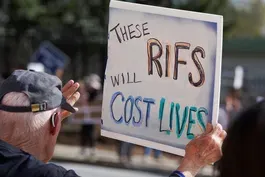
Coral bleaching is affecting nearly all reefs, report says
Clip: 4/26/2025 | 3m 21sVideo has Closed Captions
Coral bleaching is affecting nearly all the world’s reefs, new NOAA report says
Coral reefs are a crucial part of the marine ecosystem, providing habitats for all sorts of marine life and protecting coastlines from storm damage. But scientists say rising ocean temperatures are posing a grave threat to the future of the world’s reefs. Ali Rogin reports.
Problems with Closed Captions? Closed Captioning Feedback
Problems with Closed Captions? Closed Captioning Feedback
Major corporate funding for the PBS News Hour is provided by BDO, BNSF, Consumer Cellular, American Cruise Lines, and Raymond James. Funding for the PBS NewsHour Weekend is provided by...

Coral bleaching is affecting nearly all reefs, report says
Clip: 4/26/2025 | 3m 21sVideo has Closed Captions
Coral reefs are a crucial part of the marine ecosystem, providing habitats for all sorts of marine life and protecting coastlines from storm damage. But scientists say rising ocean temperatures are posing a grave threat to the future of the world’s reefs. Ali Rogin reports.
Problems with Closed Captions? Closed Captioning Feedback
How to Watch PBS News Hour
PBS News Hour is available to stream on pbs.org and the free PBS App, available on iPhone, Apple TV, Android TV, Android smartphones, Amazon Fire TV, Amazon Fire Tablet, Roku, Samsung Smart TV, and Vizio.
Providing Support for PBS.org
Learn Moreabout PBS online sponsorshipJOHN YANG: Finally tonight, a look under the sea.
Coral reefs are a crucial part of the marine ecosystem, providing habitats for all sorts of marine life and protecting coastlines from storm damage.
But as Ali Rogin reports, scientists say rising ocean temperatures are posing a grave threat to the future of the world's reefs.
ALI ROGIN (voice-over): The Maldives Islands in the Indian Ocean are the picture of paradise.
But beneath the aqua blue water, there's a crisis unfolding.
Once vibrant coral reefs have lost their colors in what scientists say is part of the worst global bleaching event on record, impacting more than 80 countries and territories.
A report from the National Oceanic and Atmospheric Administration revealed that 84 percent of the planet's coral reefs have been hit.
The Smithsonian's Melanie McField says the bleaching is triggered by prolonged exposure to elevated ocean temperature due to human caused climate change.
MELANIE MCFIELD, Healthy Reefs for Healthy People: It's very alarming.
So I think people really need to recognize what they're doing by the inaction.
It's the kiss of death for coral reefs.
ALI ROGIN (voice-over): This is not the first mass event of its kind.
It's the fourth known widespread bleaching of coral reefs.
But the troubling part, McField says, is that these episodes keep getting worse.
Coral reefs are known as the rainforest of the sea because of their biodiversity.
But scientist Mark Eakin says ocean temperatures aren't expected to cool anytime soon.
And until they do, the heat stress on corals could lead to permanent damage or kill the reefs altogether.
MARK EAKIN, Scientist: We just may never see the heat stress that causes bleaching dropping below the threshold that triggers a global event.
So this may be the last one.
ALI ROGIN (voice-over): If coral reefs die, so could nearly a quarter of all sea life, which feed millions and sustain industries from fishing tourism.
But the good news is that corals are resilient and can recover if conditions allow.
In the depths off the Florida Keys, where water temperatures exceeded 100 degrees Fahrenheit in July 2023, efforts to try to restore damaged coral are underway.
Researchers tend nurseries in the deeper, cooler water, where conditions help sprout new buds.
They're then clipped and preserved with the goal of one day transplanting them back into the ocean to help jumpstart new growth.
Mark Eakin says these efforts are promising, but the larger global solution hinges on reducing sea temperatures.
And those efforts start on land.
MARK EAKIN: The best way to protect coral reefs is to address the root cause of climate change, and that means reducing the human emissions.
That's the biggest part.
Everything else is looking more like a band aid rather than a solution.
ALI ROGIN (voice-over): For now, scientists are urgently sounding the alarm as the world's coral reefs are being pushed into uncharted territory.
MARK EAKIN: We're looking at something that's completely changing the face of our planet.
ALI ROGIN (voice-over): For PBS News Weekend, I'm Ali Rogin.
Faithful mourners bid solemn farewell to Pope Francis
Video has Closed Captions
Clip: 4/26/2025 | 5m 54s | World leaders and faithful mourners bid solemn farewell to Pope Francis (5m 54s)
How NIH staffing cuts may delay a promising cancer treatment
Video has Closed Captions
Clip: 4/26/2025 | 6m 18s | How NIH staffing cuts may delay a promising cancer treatment’s implementation (6m 18s)
News Wrap: Iranian port rocked by massive, deadly explosion
Video has Closed Captions
Clip: 4/26/2025 | 3m 4s | News Wrap: Iranian port rocked by massive, deadly explosion (3m 4s)
What to expect as cardinals prepare to elect a new pope
Video has Closed Captions
Clip: 4/26/2025 | 4m 44s | What to expect as the College of Cardinals prepares to elect a new pope (4m 44s)
Providing Support for PBS.org
Learn Moreabout PBS online sponsorshipSupport for PBS provided by:
Major corporate funding for the PBS News Hour is provided by BDO, BNSF, Consumer Cellular, American Cruise Lines, and Raymond James. Funding for the PBS NewsHour Weekend is provided by...















